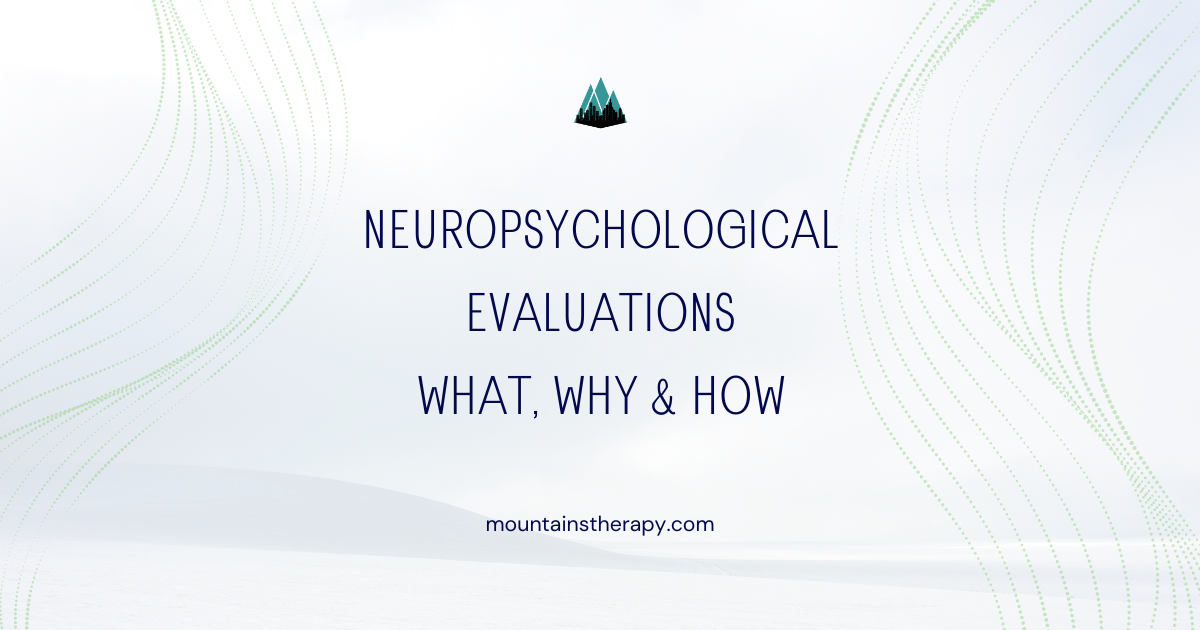Neuropsychological Evaluations: A Guide to What, Why, and How
Learn more about Individual Mental Health Counseling here.
In This Blog, You’ll Learn:
- What neuropsychological evaluations are and their purpose
- When and why to consider an evaluation
- Who conducts these evaluations and where to find them
- The process, duration, and potential diagnoses
- How to make sense of results and access further support
At Mountains Therapy in NJ, we often receive questions about neuropsychological evaluations—what they are, how they work, and why they’re important. These comprehensive assessments provide valuable insights into cognitive, emotional, and behavioral functioning, helping individuals and families address complex concerns. Although we do not provide these evaluations, we can provide you with basic information about them.
What is a Neuropsychological Evaluation?
A neuropsychological evaluation is a thorough assessment designed to understand how the brain affects various cognitive and behavioral processes. It evaluates areas such as memory, problem-solving, attention, and emotional regulation. Many people ask, "What is a neuropsychological evaluation used for?" These assessments are often utilized for diagnosing conditions like ADHD, autism, and learning disorders, as well as understanding cognitive impairments in adults.
- For example, "Can a neuropsychological evaluation diagnose autism?" Yes, it can play a significant role in identifying autism spectrum disorder by analyzing social, emotional, and cognitive patterns.
When to Get a Neuropsychological Evaluation
You might wonder, "When should I get a neuropsychological evaluation?" or "Why do a neuropsychological evaluation?" These evaluations are recommended when there are concerns about developmental delays, learning difficulties, memory issues, or changes in behavior. They are also valuable for understanding conditions like ADHD, autism, or brain injuries.
Who Can Perform a Neuropsychological Evaluation?
Neuropsychological evaluations are typically conducted by licensed clinical neuropsychologists—specialists trained in both psychology and neuroscience. These professionals have expertise in assessing how brain functioning affects behavior, cognition, and emotions. When searching for an evaluator, consider professionals with the following qualifications:
- A doctorate (Ph.D. or Psy.D.) in psychology with specialized training in neuropsychology.
- State licensure to practice clinical neuropsychology.
- Certification by organizations like the American Board of Professional Psychology (ABPP) or equivalent credentials.
Other licensed professionals, such as clinical psychologists with advanced training in neuropsychology, may administer certain parts of the evaluation under supervision. It’s essential to confirm the credentials and experience of the provider to ensure high-quality care.
How is a Neuropsychological Evaluation Performed?
The process involves several steps, including interviews, standardized tests, and observations. If you’ve been asking, "How is a neuropsychological evaluation performed?", the process typically begins with gathering a detailed history. Next, the individual completes various tasks that measure cognitive, motor, and emotional functioning. It’s important to note that these assessments are non-invasive but require focus and effort.
Where to Get a Neuropsychological Evaluation
If you’re wondering, "Where can I get a neuropsychological evaluation near me?", evaluations are commonly available at the following locations:
- Hospitals or medical centers with neuropsychology departments.
- Private practices specializing in neuropsychology.
- Academic or research institutions.
- Clinics focusing on developmental, neurological, or psychological assessments.
While Mountains Therapy does not perform these evaluations or provide referrals, we encourage you to reach out to your primary care physician, local hospitals, or clinics to find a qualified provider near you.
How Long Does a Neuropsychological Evaluation Take?
The length of time varies based on the individual and the complexity of the case. Many ask, "How long does a neuropsychological evaluation take?" or "How long is a neuropsychological evaluation?" Generally, it can take anywhere from several hours to a full day, spread over multiple sessions.
What Can a Neuropsychological Evaluation Diagnose?
A common question is, "What can a neuropsychological evaluation diagnose?" These evaluations can identify learning disabilities, ADHD, autism, and even early signs of dementia. For children, the focus may include identifying developmental delays or academic challenges. Adults often use evaluations to clarify cognitive changes related to aging or medical conditions.
Why Get a Neuropsychological Evaluation?
Understanding cognitive strengths and weaknesses can empower individuals to access the right interventions. If you’re asking, "Why get a neuropsychological evaluation?", consider its role in tailoring treatments, supporting educational plans, or guiding medical decisions. For example, it can inform the need for therapy, accommodations at school, or further medical evaluations.
Cost and Accessibility
Questions like, "How much does a neuropsychological evaluation cost?" are common. Costs vary based on the provider, location, and insurance coverage. At Mountains Therapy, we aim to connect clients with helpful information and support as they navigate these decisions.
Making Sense of Results
Interpreting the findings is essential. If you’re wondering, "How to read a neuropsychological evaluation," we recommend working closely with the evaluator to understand the results and implications. Clear communication ensures individuals and families can make informed decisions about next steps.
Although we do not conduct these evaluations or provide referrals, Mountains Therapy is committed to offering helpful, reliable information to support your journey. By understanding what these evaluations involve and how to access them, you can take the first step toward clarity and informed decision-making. If you have further questions, we’re here to help guide you with general information and support.











